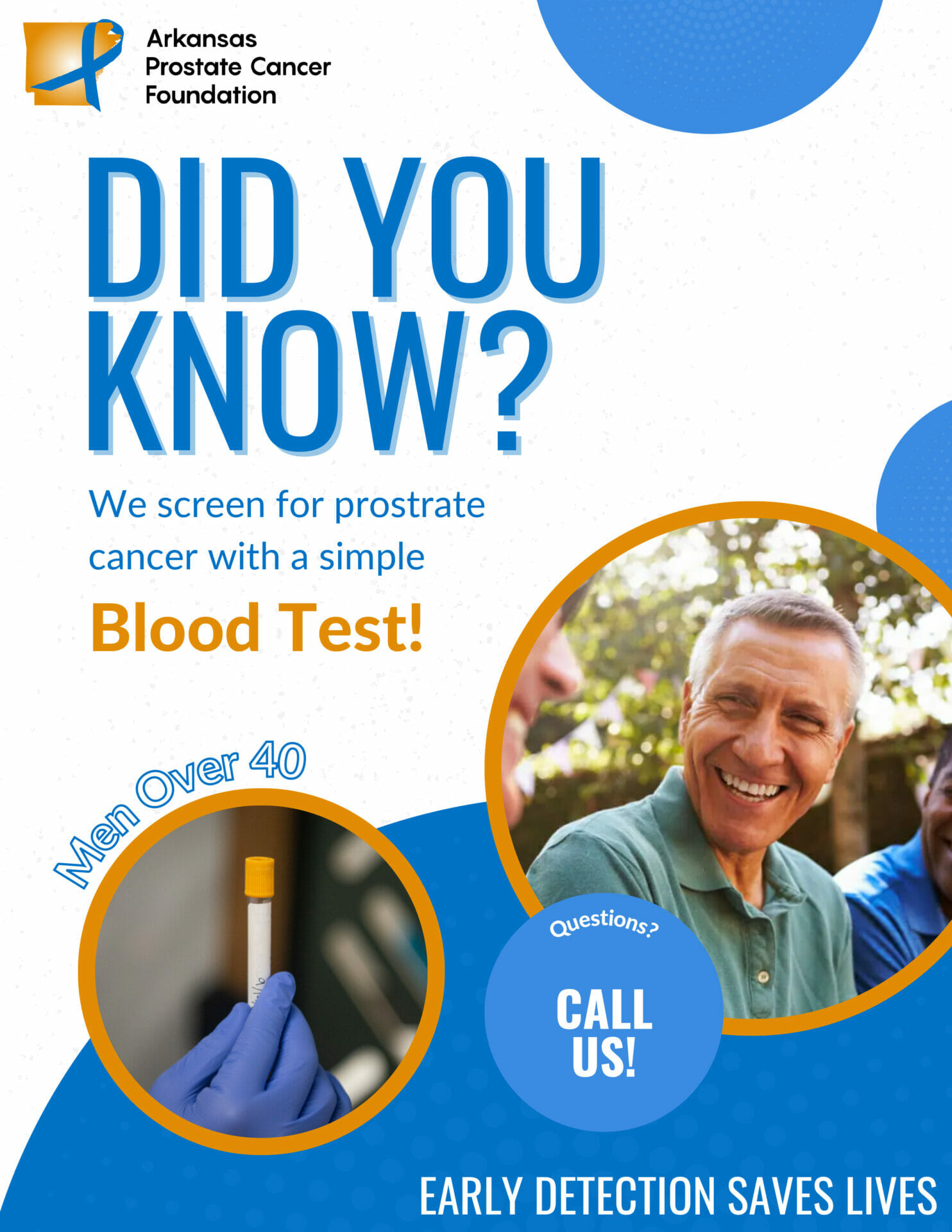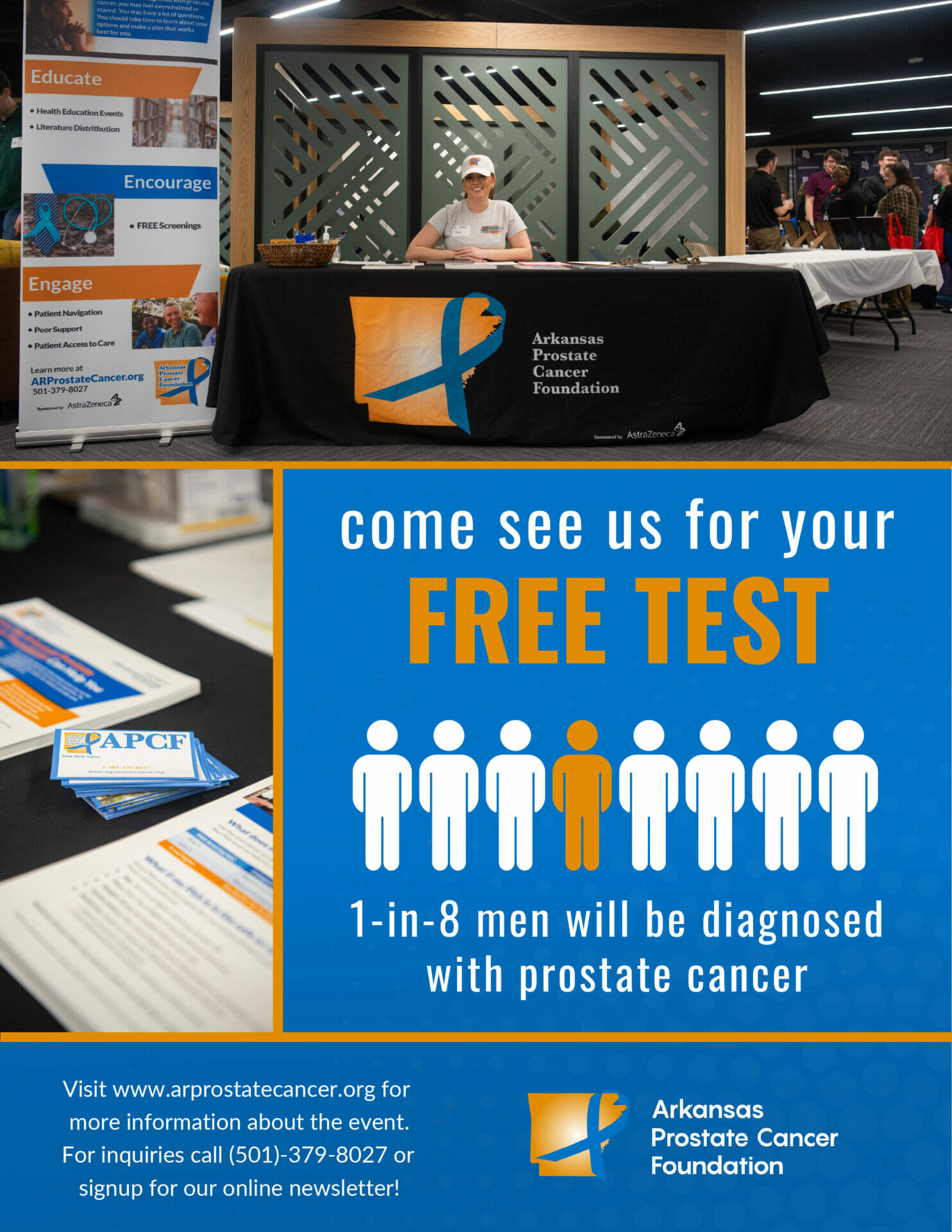Screen Today. Don’t Wait.
Before men can take control of their prostate health, they first need to be aware of their risk. The Arkansas Prostate Cancer Foundation provides various services free of charge to the men of Arkansas, including education and screening programs.
Screening Events

At the screening events, APCF conducts education on informed decision-making, administers screening, and provides all medical supplies as well as access to laboratory services through a partnership with Baptist Health (support from other laboratory providers may also be secured where available).
Following events, APCF analyzes lab reports by reference to the Guidelines for Early Detection of Prostate Cancer established by the National Comprehensive Cancer and notifies men by mail of their screening results with recommendations on follow-up steps if needed.
For men with suspicious test results, the APCF Patient Navigator will make direct contact to explain test results, answer questions, and advise urological consult if more investigation is warranted.


What to Know Before You Take a Test.
There are two tests used to help doctors screen for prostate cancer:
- Prostate-Specific Antigen (PSA) Blood Test
PSA is a protein produced by cells of the prostate gland. This test measures the level of PSA in the blood.
It is normal for men to have a low level of PSA in their blood. Higher levels of PSA can indicate either prostate cancer or benign (not cancerous) issues in the prostate.
As men age, both prostate cancer and benign prostate conditions become more common. The most frequent benign prostate conditions are prostatitis (inflammation of the prostate) and benign prostatic hyperplasia (BPH) or enlargement of the prostate. There is no evidence that prostatitis or BPH causes cancer, but it is possible for a man to have one or both of these conditions and to develop prostate cancer as well. - Digital Rectal Exam (DRE)
The U.S. Food and Drug Administration (FDA) approved the use of the PSA test along with a digital rectal exam (DRE) to help detect prostate cancer.
During a DRE, a doctor inserts a gloved finger into the rectum and feels the prostate gland through the rectal wall to check for bumps or abnormal areas. Doctors often use the PSA test and the DRE as prostate cancer screening tests. Your doctor might do a PSA blood test alone, or he might do both tests. These tests can help doctors detect prostate cancer in men who have no symptoms of the disease.
A man’s PSA level and DRE status may not give doctors enough information to distinguish between cancer and benign prostate conditions. Only a biopsy can diagnose prostate cancer.
The doctor will consider the results of the PSA and DRE tests when deciding whether to check further for evidence of cancer. During a biopsy, samples of prostate tissue are removed by a needle and viewed under a microscope.
1 in 8 Men Will Be Diagnosed with Prostate Cancer
How to address prostate cancer presents a complicated public health problem. The disease is common in men, and a man has a one in nine chance of developing the disease in his lifetime.
Prostate cancer is the second leading cause of cancer death among U.S. men; but when detected and treated in the early stages of the disease, before symptoms are present, five-year survival rates are well over 90 percent. Over the past two decades in the United States, death rates for prostate cancer have fallen 45 percent, largely due to early detection and/or improved treatment.
However, not all prostate cancer is life-threatening. There are many cases where a man with prostate cancer lives the duration of his life without symptoms from the disease. Research on distinguishing aggressive, life-threatening diseases from harmless, indolent tumors is ongoing, and there are many new tests on the market.
Because of the difficulty of distinguishing between aggressive and indolent prostate cancer, there is currently no consensus in the medical community on whether men should be routinely screened for prostate cancer. However, there is one area of agreement—men should have an open and honest discussion on the benefits and risks of screening and make the decision they feel is best for them.
To help men decide whether or not to be screened for prostate cancer, the APCF has developed a Decision Aid for Patients.
If you decide that prostate cancer screening is best for you, check the dates and locations of Education/Screening Sites nearest to you.
Interested in hosting your own screening event? Contact Desha McCluskey for information. Click here.

